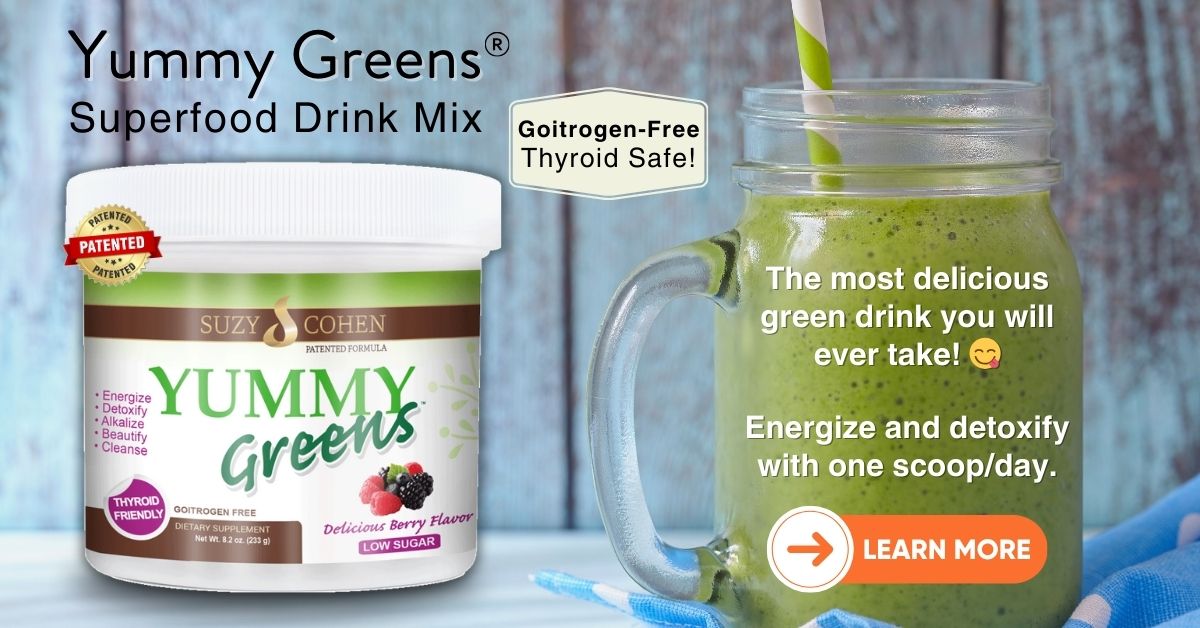Some people eat nothing but fruit. They are called fruitarians and being a fruitarian is something you choose. While I do not support a 100% fruit-only diet for everyone, I definitely see the virtues in fruits!
I highly recommend you include fruits in your diet. You don’t have to be a frugivore either.
A frugivore is an animal that lives primarily -but not exclusively- on fruit, berries or succulent leaves. Think of chimpanzees, gorillas, orangutans, maned wolves, fruit bats, woodpeckers, chickadees, pheasants, quail and a few other critters. A frugivore is ‘born’ into their species, and eats this way from birth, whereas a fruitarian is choosing a specific diet, similarly to a vegetarian.
Eating fruit in moderation can be very healthy for you. The colors of each fruit contain dyes that act as impressive antioxidants and anti-cancer compounds. Think of beta-carotene, a natural dye in apricots, cantaloupe and other orange colored fruit. That’s just one example.
Fruits are delicious and provide natural fiber for colon health, plus they contain natural antioxidants and anti-inflammatory compounds. This serves to tamp down some of the pain cytokines that your body has run amok with.
These are the 9 Delicious Fruits that Protect You Like Medicine
1. Apricots.
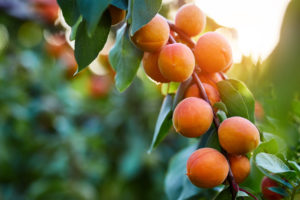
Apricots are yellow-orange and the color comes from beta carotene which is a precursor to vitamin A. They also contain lutein and zeaxanthin. These are all useful for vision. Apricots have been studied for their beneficial role in fatty liver. They are a quick, delicious way to get some fiber too, which is useful if you’re seeking more regularity and less constipation. The oil is useful too. Apricot kernel oil can be used as a carrier oil for essential oils, as well as to make natural skin care creams. If this interests you, take 5 to read, Luxurious Body Creams that Won’t Cause Cancer.
2. Pomegranates.
These fruits contain compounds that naturally lower your blood pressure. If you drink more than say a shot glass per day, and you’re also taking blood pressure medications, your numbers may go too low.
When I say “blood pressure medications” here are a few popular ones: Verapamil (Calan SR), Captopril (Capoten), enalapril (Vasotec), lisinopril (Prinivil, Zestril), nifedipine (Procardia), ramipril (Altace), and others. Speaking of blood pressure, you might enjoy my article, POTS- How Salt Affects Your Blood Pressure.
Pomegranate juice has another helpful effect on the body in that is a natural, mild blood thinner. But of course, it may exacerbate blood thinning if you combine it with anticoagulant drugs which you should not do, or if you do, you should lower your blood pressure med dose according to your physician’s orders.
3. Fig fruit.
Figs are now being studied for their ability to help with symptoms of Metabolic Syndrome and diabetes. They are high in potassium (and low in sodium) which means they can reduce elevated blood pressure. They contain powerful antioxidant compounds which fight free radicals.
Also, the figs contain abscisic acid, which has been studied for its ability to help with carbohydrate metabolism and blood sugar. Fig fruit has now been added to GlucoScript MAX, by the way, a dietary supplement that I formulated to support healthy blood sugar and cholesterol.
Furthermore, fig leaves have an inhibitory effect on triglycerides, making their overall number drop. Triglycerides are another major factor behind various heart diseases. If the topic of triglycerides and lipid ratios interests you, read my article, Take EPA with Your Statin for Best Results.
4. Prunes.
Prunes work by suppressing the rate of bone turnover. In fact, prominent researchers wrote an article in the British Journal of Nutrition and after studying the fruits, they came to the conclusion that prunes are “the most effective fruit in both preventing and reversing bone loss.”
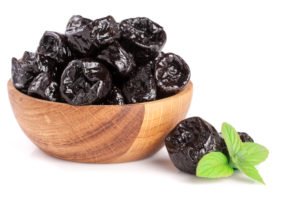
The effects remained detectable five years later when the women who had eaten prunes years earlier still had improved bone mineral density compared to controls! For more on this specific topic, HERE is another article I wrote, Prunes Can Help Osteoporosis and Blood Pressure.
5. Strawberries.
Strawberries containing ferulic acid have been shown to have a remarkably high scavenging activity toward chemically generated radicals, thus making them effective in inhibiting oxidation of human LDLs. Did you know that strawberries contain natural salicylates in them? If you’re allergic to aspirin, you will probably want to avoid strawberries, and you should read my article, 36 Foods That Contain Aspirin.
You can make ice cubes using strawberries. I’ll tell you how right now in my article, 10 Medicinal Ice Cube Recipes to Help You Lose Weight.
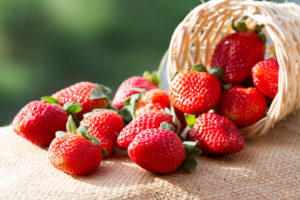
6. Blackberries.
These contain antibacterial compounds that are thought to help with gum disease. Also, the natural dye in blackberries is called anthocyanins, giving fruits that dark purple, blue or blackish color.
Anthocyanins are useful for plants to protect from stress, and it’s essentially the same in humans. These little berries contain a lot of quercetin and ellagic acid which taken together act as very strong free-radical scavengers and protect your cells from DNA damage. This could be helpful if you have a history of cancer.
7. Grapefruits.
This citrus fruit can help with appetite suppression and may be useful as an adjunct to your weight loss program and exercise regimen. It has some fiber so that is part of why it works, but also it controls over-eating. It can spark more production of cholecystokinin which is a ‘stop sign’ hormone that suppresses hunger. Grapefruit’s action on metabolism was published in the International Journal of Obesity.
Grapefruit rind (and orange rind) contain a lot of naringen, a compound that causes a bitter taste in the fruit. This compound is the one that interacts with some antihistamines and statins. That said, naringen is also known for it’s cough-suppressant action, and ability to help out with asthma.
There is some research pointing to grapefruit’s phenolic compounds having the ability to inhibit proliferation and spread of some cancer cells. For that reason, you should be careful and ask your oncologist about grapefruit if you are on a chemotherapy drug. There are interactions, and in some cases, it is not good to combine the two, and in other cases, it could be synergistic. It depends on your liver pathway metabolism, the type of cancer, the stage, as well as the cancer protocol you are being treated with.
If you do not take a chemo drug but are dealing with dysplasia or other growths, I’d highly recommend citrus fruits like grapefruit and orange… as well as black or blueberries, and of course routine physician care/treatment.
Apples.
These could help reduce stroke, compliments of the high amount of quercetin. This effect was even confirmed by a STUDY published in the European Journal of Clinical Nutrition which evaluated 9,208 men and women, concluding, “The intake of apples is related to a decreased risk of thrombotic stroke. This association apparently is not due to the presence of the antioxidant flavonoid quercetin.”
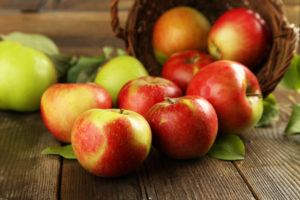
Green apples are very high in magic acid, which is the same acid commonly found in other fruits. It imparts a slightly sour, tart taste. When applied to the skin, apple slices (malic acid) may help with melasma, a condition that causes brownish-grey patches on the skin. Consuming apples may help with muscle pain and fatigue. You might like this article I wrote which discusses a compound in apples that appear to help prevent plaquing of the brain: Green Apples and Your Brain
Raspberries.
The fruit itself contains vitamin C, quercetin and ellagic acid. These are all strong antioxidants and fight cancer and inflammation. The leaves of raspberries have been used to create commercial teas which are widely available. The leaves contain fragarine, which is a strong inhibitor of uterine contractions. In other words, a cup of raspberry leaf tea can help with PMS. One more thing, here’s my mouth-watering recipe for Mint Yogurt with Berries, which includes fresh raspberries, blueberries and blackberries. You can use all 3 berries, or choose one. Either way, I’m confident you’ll find it quite delicious, especially in the summertime.

Suzy Cohen, has been a licensed pharmacist for over 30 years and believes the best approach to chronic illness is a combination of natural medicine and conventional. She founded her own dietary supplement company specializing in custom-formulas, some of which have patents. With a special focus on functional medicine, thyroid health and drug nutrient depletion, Suzy is the author of several related books including Thyroid Healthy, Drug Muggers, Diabetes Without Drugs, and a nationally syndicated column.

